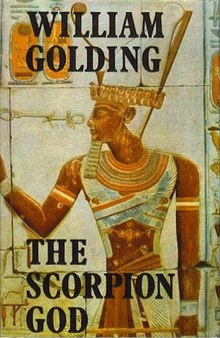
Brian Wilson Aldiss was an English writer, artist and anthology editor, best known for science fiction novels and short stories. His byline reads either Brian W. Aldiss or simply Brian Aldiss, except for occasional pseudonyms during the mid-1960s.

Heart of Darkness (1899) is a novella by Polish-English novelist Joseph Conrad in which the sailor Charles Marlow tells his listeners the story of his assignment as steamer captain for a Belgian company in the African interior. The novel is widely regarded as a critique of European colonial rule in Africa, whilst also examining the themes of power dynamics and morality. Although Conrad does not name the river on which most of the narrative takes place, at the time of writing, the Congo Free State—the location of the large and economically important Congo River—was a private colony of Belgium's King Leopold II. Marlow is given a text by Kurtz, an ivory trader working on a trading station far up the river, who has "gone native" and is the object of Marlow's expedition.

Sir William Gerald Golding was a British novelist, playwright, and poet. Best known for his debut novel Lord of the Flies (1954), he published another twelve volumes of fiction in his lifetime. In 1980, he was awarded the Booker Prize for Rites of Passage, the first novel in what became his sea trilogy, To the Ends of the Earth. He was awarded the 1983 Nobel Prize in Literature.

William IV was King of the United Kingdom of Great Britain and Ireland and King of Hanover from 26 June 1830 until his death in 1837. The third son of George III, William succeeded his elder brother George IV, becoming the last king and penultimate monarch of Britain's House of Hanover.

Horus, also known as Heru, Har, Her, or Hor in Ancient Egyptian, is one of the most significant ancient Egyptian deities who served many functions, most notably as the god of kingship, healing, protection, the sun, and the sky. He was worshipped from at least the late prehistoric Egypt until the Ptolemaic Kingdom and Roman Egypt. Different forms of Horus are recorded in history, and these are treated as distinct gods by Egyptologists. These various forms may be different manifestations of the same multi-layered deity in which certain attributes or syncretic relationships are emphasized, not necessarily in opposition but complementary to one another, consistent with how the Ancient Egyptians viewed the multiple facets of reality. He was most often depicted as a falcon, most likely a lanner falcon or peregrine falcon, or as a man with a falcon head.

In ancient Greek religion and mythology, Pan is the god of the wild, shepherds and flocks, rustic music and impromptus, and companion of the nymphs. He has the hindquarters, legs, and horns of a goat, in the same manner as a faun or satyr. With his homeland in rustic Arcadia, he is also recognized as the god of fields, groves, wooded glens, and often affiliated with sex; because of this, Pan is connected to fertility and the season of spring.

Sir William Hamilton, KB, PC, FRS, FRSE was a British diplomat, politician, antiquarian and vulcanologist who served as the Envoy Extraordinary to the Kingdom of Naples from 1764 to 1800. After sitting in the House of Commons of Great Britain from 1761 to 1764, he began working as a diplomat, succeeding Sir James Gray as the British ambassador to the Kingdom of Naples. While in Italy, Hamilton became involved in studying local volcanoes and collecting antiquities, becoming a fellow of the Royal Society and being given the Copley Medal. His second wife was Emma Hamilton, who was famed as the mistress of Horatio Nelson, 1st Viscount Nelson.

Userkhaure-setepenre Setnakhte was the first pharaoh (1189 BC–1186 BC) of the Twentieth Dynasty of the New Kingdom of Egypt and the father of Ramesses III.

Robert Fordyce Aickman was an English writer and conservationist. As a conservationist, he co-founded the Inland Waterways Association, a group which has preserved from destruction and restored England's inland canal system. As a writer, he is best known for his supernatural fiction, which he described as "strange stories".

William Charles Mariner was an Englishman who lived in Tonga from 29 November 1806 to (probably) 8 November 1810. He published a memoir, An Account of the Natives of the Tonga Islands, in the South Pacific Ocean, which is one of the major sources of information about Tonga before it was influenced significantly by European cultures and Christianity.

The Bono, also called the Brong and the Abron, are an Akan people of West Africa. Bonos are normally tagged Akan piesie or Akandifo of which Akan is a derivative name. Bono is the genesis and cradle of Akans. Bono is one of the largest ethnic group of Akan and are matrilineal people. Bono people speak the Bono Twi of Akan language. Twi language, thus the dialect of Bono is a derivative of a Bono King Nana Twi. In the late fifteenth century, the Bono people founded the Gyaaman kingdom as extension of Bono state in what is now Ghana and Côte d'Ivoire.
"Jugband Blues" is a song by English rock band Pink Floyd, released on their second album, A Saucerful of Secrets, in 1968. Written by Syd Barrett, it was his sole compositional contribution to the album, as well as his last published for the band. Barrett and Pink Floyd's management wanted the song to be released as a single, but were vetoed by the rest of the band and producer Norman Smith.

The Inheritors is a work of prehistoric fiction and the second novel by the British author William Golding, best known for his first novel, Lord of the Flies (1954). It concerns the extinction of one of the last remaining tribes of Neanderthals at the hands of the more sophisticated Homo sapiens. It was published by Faber and Faber in 1955.

John Brabazon Ponsonby, 1st Viscount Ponsonby, GCB was a longtime British diplomat and politician. He was considered an exceptionally handsome man – reportedly he was almost lynched as an aristocrat in a Paris street by a revolutionary mob in the 1790s but saved by the intervention of a mob of women who saved him because he was so pretty.

"Envoy Extraordinary" is a 1956 novella by British writer William Golding, first published by Eyre & Spottiswoode as one third of the collection Sometime, Never, alongside "Consider Her Ways" by John Wyndham and "Boy in Darkness" by Mervyn Peake. It was later published in 1971 as the second of three novellas in Golding's collection The Scorpion God.
The Green Snake and the Beautiful Lily is a fairy tale by Johann Wolfgang von Goethe published in 1795 in Friedrich Schiller's German magazine Die Horen. It concludes Goethe's novella rondo Conversations of German Emigrants (1795). Das Märchen is regarded as the founding example of the genre of Kunstmärchen, or artistic fairy tale. The story revolves around the crossing and bridging of a river, which represents the divide between the outer life of the senses and the ideal aspirations of the human being.

Puck of Pook's Hill is a fantasy book by Rudyard Kipling, published in 1906, containing a series of short stories set in different periods of English history. It can count both as historical fantasy – since some of the stories told of the past have clear magical elements, and as contemporary fantasy – since it depicts a magical being active and practising his magic in the England of the early 1900s when the book was written.
Lewis's trilemma is an apologetic argument traditionally used to argue for the divinity of Jesus by postulating that the only alternatives were that he was evil or mad. One version was popularized by University of Oxford literary scholar and writer C. S. Lewis in a BBC radio talk and in his writings. It is sometimes described as the "Lunatic, Liar, or Lord", or "Mad, Bad, or God" argument. It takes the form of a trilemma — a choice among three options, each of which is in some way difficult to accept.
Benjamin Goodison, of London, was a royal cabinetmaker to George II of Great Britain, supplying furnishings to the royal palaces from 1727 to the time of his death. He served his apprenticeship with James Moore, who died accidentally in October 1726; Moore was the pre-eminent London cabinetmaker during the reign of George I. Goodison's classicizing case furniture owes much of its inspiration to the neo-Palladian designs of William Kent; outstanding documented examples are the pair of part-gilded mahogany commodes and library writing-tables Goodison made for Sir Thomas Robinson of Rokeby Hall, Yorkshire, now in the Royal Collection; they have boldly-scaled Greek key fret in their friezes and lion masks gripping brass rings heading scrolling consoles at their corners.
Moses, Man of the Mountain is a 1939 novel by African-American novelist and anthropologist Zora Neale Hurston. The novel rewrites the story of the Book of Exodus of Moses and the Israelites from an Afro-American perspective. The novel applies a number of different motifs and themes commonly addressed in African-American culture, subverting the Moses story.















